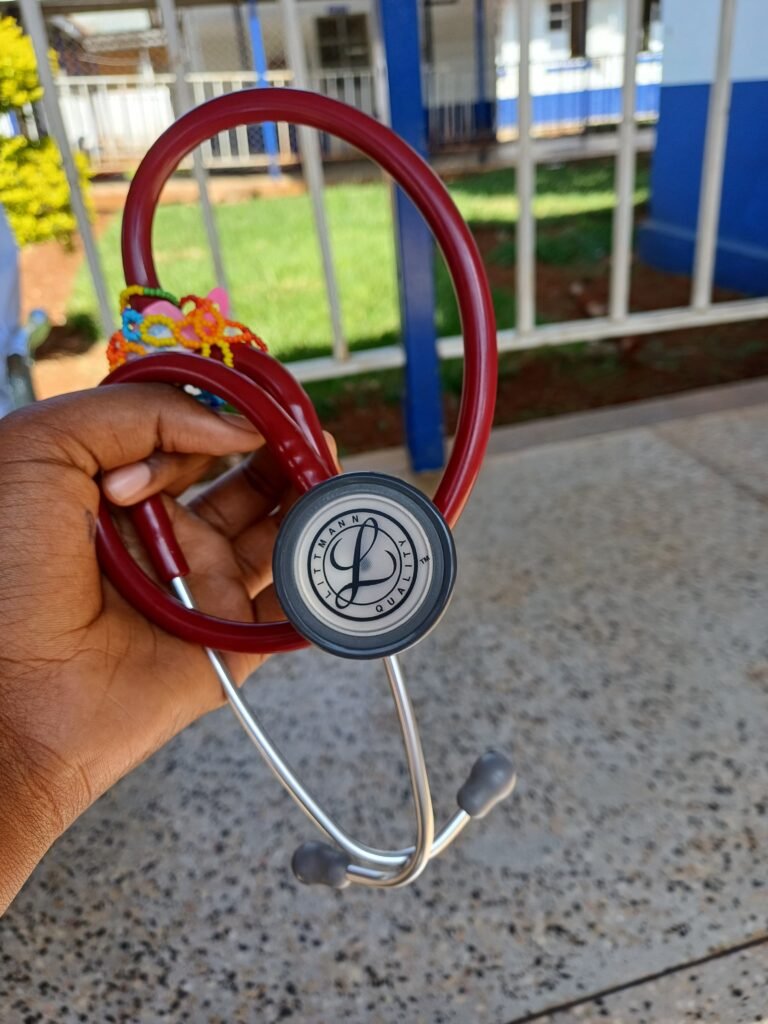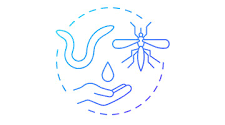Here is a checklist I wish I’d had before embarking on my first day on the ward as a medical student. Feel free to adapt it as you wish and make it your own.
- Lab coat – Your number one identifier as a medical professional, along with item number 2 on our list. It can be long or short, with your name and title embossed on the pocket, or with a name tag. It’s always nice when a patient calls you by your name. The white lab coat will at least earn you the honorary title of ‘Daktari’ among your patients (unless you’re a lady in which case it’ll probably still be ‘Sister’ for you :)). Get a lab coat with a comfortable fit and as many pockets as possible, which will come in very handy as we will see.
- Stethoscope – The pathognomonic sign of a Daktari is a white lab coat with a stethoscope slung around the neck. You need it on your person at all times on the ward, regardless of whether or not you actually know how to use it. (YouTube is your friend). This and the rest of your medical equipment: thermometer, tape measure, patella hammer, MUAC tape, and so on, will be your trusty aids in your examination of your patients. Stuff them into your numerous lab coat pockets and keep an eye on them as they seem to grow legs in the ward. Them and blue pens.
- Ward-appropriate shoes – You will be on your feet, that much is certain. Your shoes need to be closed and anti-slip (various bodily fluids on the floors), easy to wipe down (aforementioned fluids), and as comfortable as possible. You may need to run in them as well. Away from or after a patient as the case may be. Only joking. Kind of.
- Several pairs of scrubs – New or thrifted, matching or mismatched sets, scrubs worn under your lab coat will save you on days when you have no energy or inspiration to spare on putting together an outfit. Also, have I mentioned the fluids? Better your scrubs than your favorite pair of pants.
- Face mask – This will provide some measure of protection to patients from your own germs, and to yourself from the menagerie of airborne pathogens, and possibly any unpleasant smells (this is the last time I’ll mention those fluids). Pop a small bottle of hand sanitizer into pocket #16 as well.
- Notebook and pens – You need somewhere to jot down all the things you don’t know and need to study afterwards. This may be every single thing you hear. In addition, when your superiors are speaking, you might manage to grasp a few pearls of knowledge that you will never find in any medical textbook ever. Existentialism may hit in the middle of a ward round and you may need a place to scribble questions to ponder like “What am I doing with my life?” And “Will I ever be happy?” Stash a couple of extra pens in one of your various lab coat pockets, because the one you start the day out with will invariably disappear into the pen abyss I’m convinced is under every hospital.
- A watch – Digital, analog, smart, whatever works for you. It’ll enable you to discretely count your patient’s respirations and check their pulse rate. It’ll also enable you to acutely feel every second of your 6-hour internal medicine ward round. You’ll never need a watch to tell you it’s lunchtime though. Nothing smells better than the aroma of hospital food wafting into the ward at noon, especially when the light at the end of the tunnel that is Imed ward rounds is not yet visible.
- A full belly – This was a hard learned lesson. Ward work will have you ravenous. Have a hearty breakfast, with protein if possible because you’ll burn through those mandazis in a couple of hours. If you’re a lady on your cycle, take extra heed lest you swoon onto an unsuspecting patient. All joking aside, do take care of yourself, body and mind. You cannot pour from an empty cup, and some suffering is unnecessary. Your brain will work better with a steady supply of glucose too. Good for you, good for your patients, a win-win.
- A healthy dose of humble pie – Speaking of eating, there is no place for pride or arrogance on the ward. Swallow it. Be polite and respectful, not just to more senior doctors and personnel, but to every nurse, fellow student, porter, janitor, and of course your patients. Accept corrections gracefully, seeing them as an opportunity to learn, and remember that you can learn from absolutely anyone; other members of staff, and even your patients.
- A winning attitude – You need to keep a light of hope and inspiration glowing in your chest, especially for those hard days where everything seems to go wrong and despair beckons. It’s okay. It’s a hard day not a hard life. Hopefully. I’m hoping as well. For me, the opportunity to be a doctor is one of the greatest privileges of my life. To be so trusted, to hold such a responsibility, to have such a rich and varied daily experience. We’re winners! Don’t forget it. And this attitude can be embodied without it giving way to superiority or God complexes.
- A smile? – On the days when you can muster one up, by all means, do. It may not be fully visible under your mask, but it will soften your eyes and make you a less threatening presence. I imagine a scowling, masked, gowned figure looming over the bedside is not very comforting for the patient. Even worse if you have a pair of glasses perched onto the tip of your nose. Studies show that the mere act of smiling even when you don’t feel particularly happy can release endorphins and other nice chemicals that might elevate your mood, and the patient will have a friendly face to look at. Another win-win.
- Your wits – Finally, as I was once told, the ward is not your mother’s house. Keep your wits sharp and about you. Be aware and attentive, your assistance or attention may be required at any time. It might be tricky to find your place on the ward especially as a (lowly) medical student, firmly at the bottom of the hierarchy, but look around. There’s always a task or procedure to perform: a patient requiring a line, lab results to fetch, a nurse with an entire cart of medications to administer. In time you will fit right in, and the ward will become, not your mother’s house for sure, but a second home of sorts all the same.
There you have it. Now you’re ready for your first day on the ward. Take care and I wish you all the very best!




